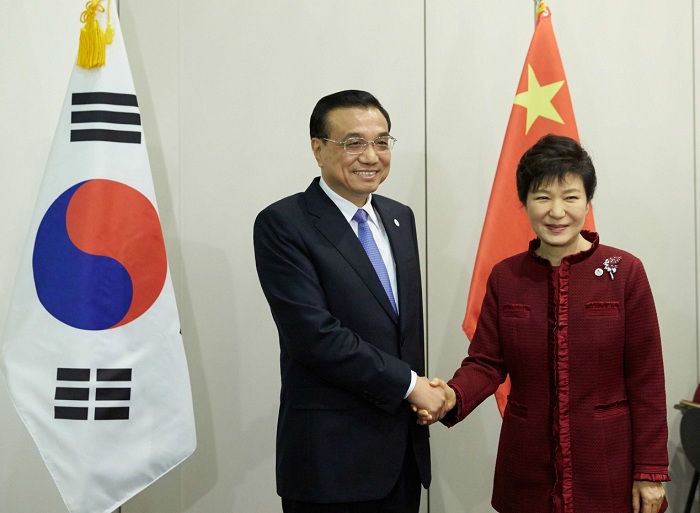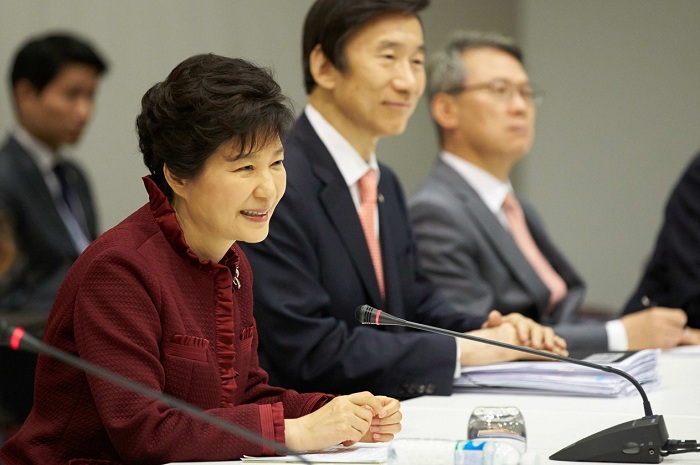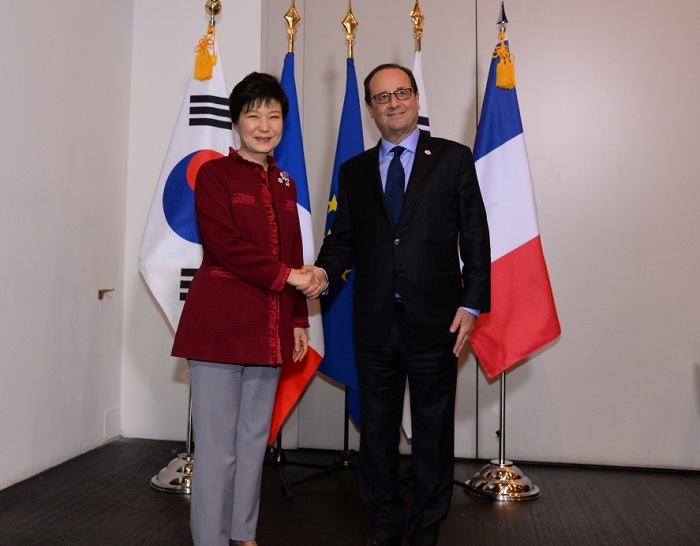President Park Geun-hye had a summit with Chinese Premier Li Keqiang on October 16 to discuss their bilateral relationship and economic cooperation between Korea and China, as well as the current situation on the Korean Peninsula.
President Park praised the recent developments and economic improvements in China. She expects strengthened economic cooperation in a diverse range of fields between the two countries, which would help to bring a paradigm shift to secure sustainable economic growth. Premier Li showed strong agreement with the statement.


Park also said that the volume of bilateral trade between the two neighbors has been on a steady rise and that the two countries need a stable global trade system in order to increase their volume of trade to USD 300 billion by 2015, as agreed at a summit in July. She suggested that both countries cooperate on finalizing a free trade agreement by the end of the year.
The two leaders reaffirmed their mutual agreement about the denuclearization of North Korea and agreed to solidify their cooperation and communication on that issue in the future. Park explained Korea's current efforts to achieve reunification on the Korean Peninsula, starting with feasible plans to open new ties with the North in areas like public welfare, environment and culture. She mentioned that the South will help tear down the wall of separation and pave the way for mutual development. She also said that the demilitarized zone, the symbol of separation on the Korean Peninsula, should be turned into an international, ecological "peace park."
Chinese Premier Li expressed his support for security and the peaceful reunification of the Korean Peninsula. He vowed to play a constructive role and to support improved relations between the North and the South. Mentioning China's support for Park's Northeast Asia Peace and Cooperation Initiative, President Park asked for China's participation in the initiative and hoped that he would pay attention to the launch of the Northeast Asia nuclear safety group, part of the initiative.
In addition, President Park mentioned her administration's Eurasia Initiative, a plan currently being carried out to enhance substantive cooperation between Eurasian countries through an expanded network of transport and logistics systems. It's a macro-scale plan to link Asia and Europe and it requires China's cooperation, she said. The president expects China to send experts to the symposium proposed at the Asia-Europe Meeting (ASEM). The Chinese leader, in turn, expressed his support for this initiative, saying that China has a similar plan and strongly supports joint research into the matter.
On the same day, prior to the summit with China, President Park Geun-hye held another summit with French President François Hollande to discuss current follow-up measures after their bilateral summit last November. They also covered bilateral cooperation and various other regional and international affairs.
Both presidents said that their comprehensive bilateral partnership has been solidified, as agreed upon during Park's visit to France last November. They agreed to strengthen cooperation on the 2015-16 Korea France Year events, in celebration of the 130 years of diplomatic relations between Paris and Seoul.

Speaking about their relationship, President Park said that France has been a companion to Korea in many creative industries, a partner in terms of its cultural renaissance and a great supporter in laying the foundation for a peaceful reunification of the Korean Peninsula. She stressed that the two countries have maintained a close cooperative relationship in both the regional and international communities, and suggested prompt follow-up measures and relevant action plans, as agreed upon at the summit in November.
Hollande agreed to this, saying that enhanced bilateral cooperation, particularly in the areas of business, education, culture, tourism and nuclear energy, would mutually benefit from each country's top-end technology. Also, he hoped for further person-to-person exchanges through a visa simplification program, expected to be completed by the end of this year. The two leaders also reaffirmed their stance on the issue of nuclear weapons, North Korea's human rights record and the peaceful reunification of the Korean Peninsula.
The leaders confirmed their determination to cope with climate change, one of the greatest global issues today, as was shown by about 100 countries at the U.N. Climate Summit 2014 in New York last September.
Park and Hollande said that the summit had created a political consensus that would move the global community to establish a post-2020 New Climate Regime. Based on this, Korea and France will cooperate closely to help bring about such an international consensus at the 21st Conference of the Parties on Climate Change (COP21) to be held in Paris by the end of 2015, they said.
The two leaders also assessed each country's contributions to the Green Climate Fund (GCF) and agreed on the effort to encourage the global community to further fund the GCF.
In addition, the French leader hoped that the two countries would continue to cooperate on aviation and would continue to work toward developing many creative industries and to encourage business-to-business projects.
Meanwhile, Park acknowledged that the technical cooperation projects going on between the two countries, such as developing driverless cars, nanoelectronics and digital healthcare, a project agreed upon during last year's summit, are all going according to plan.
Finally, Park looked forward to many more hopeful things that would come about in and after November next year, when the two countries host the Korea-France Forum on New Industrial Technical Cooperation.
By Wi Tack-whan, Lee Seung-ah, Sohn JiAe
Korea.net Staff Writers
whan23@korea.kr
President Park praised the recent developments and economic improvements in China. She expects strengthened economic cooperation in a diverse range of fields between the two countries, which would help to bring a paradigm shift to secure sustainable economic growth. Premier Li showed strong agreement with the statement.


President Park Geun-hye met Chinese Premier Li Keqiang on October 16 to discuss the bilateral relationship. (photos: Cheong Wa Dae)
Park also said that the volume of bilateral trade between the two neighbors has been on a steady rise and that the two countries need a stable global trade system in order to increase their volume of trade to USD 300 billion by 2015, as agreed at a summit in July. She suggested that both countries cooperate on finalizing a free trade agreement by the end of the year.
The two leaders reaffirmed their mutual agreement about the denuclearization of North Korea and agreed to solidify their cooperation and communication on that issue in the future. Park explained Korea's current efforts to achieve reunification on the Korean Peninsula, starting with feasible plans to open new ties with the North in areas like public welfare, environment and culture. She mentioned that the South will help tear down the wall of separation and pave the way for mutual development. She also said that the demilitarized zone, the symbol of separation on the Korean Peninsula, should be turned into an international, ecological "peace park."
Chinese Premier Li expressed his support for security and the peaceful reunification of the Korean Peninsula. He vowed to play a constructive role and to support improved relations between the North and the South. Mentioning China's support for Park's Northeast Asia Peace and Cooperation Initiative, President Park asked for China's participation in the initiative and hoped that he would pay attention to the launch of the Northeast Asia nuclear safety group, part of the initiative.
In addition, President Park mentioned her administration's Eurasia Initiative, a plan currently being carried out to enhance substantive cooperation between Eurasian countries through an expanded network of transport and logistics systems. It's a macro-scale plan to link Asia and Europe and it requires China's cooperation, she said. The president expects China to send experts to the symposium proposed at the Asia-Europe Meeting (ASEM). The Chinese leader, in turn, expressed his support for this initiative, saying that China has a similar plan and strongly supports joint research into the matter.
On the same day, prior to the summit with China, President Park Geun-hye held another summit with French President François Hollande to discuss current follow-up measures after their bilateral summit last November. They also covered bilateral cooperation and various other regional and international affairs.
Both presidents said that their comprehensive bilateral partnership has been solidified, as agreed upon during Park's visit to France last November. They agreed to strengthen cooperation on the 2015-16 Korea France Year events, in celebration of the 130 years of diplomatic relations between Paris and Seoul.

President Park Geun-hye (left) takes a photograph with her French counterpart François Hollande on October 16 after the official summit. (photo: Cheong Wa Dae)
Speaking about their relationship, President Park said that France has been a companion to Korea in many creative industries, a partner in terms of its cultural renaissance and a great supporter in laying the foundation for a peaceful reunification of the Korean Peninsula. She stressed that the two countries have maintained a close cooperative relationship in both the regional and international communities, and suggested prompt follow-up measures and relevant action plans, as agreed upon at the summit in November.
Hollande agreed to this, saying that enhanced bilateral cooperation, particularly in the areas of business, education, culture, tourism and nuclear energy, would mutually benefit from each country's top-end technology. Also, he hoped for further person-to-person exchanges through a visa simplification program, expected to be completed by the end of this year. The two leaders also reaffirmed their stance on the issue of nuclear weapons, North Korea's human rights record and the peaceful reunification of the Korean Peninsula.
The leaders confirmed their determination to cope with climate change, one of the greatest global issues today, as was shown by about 100 countries at the U.N. Climate Summit 2014 in New York last September.
Park and Hollande said that the summit had created a political consensus that would move the global community to establish a post-2020 New Climate Regime. Based on this, Korea and France will cooperate closely to help bring about such an international consensus at the 21st Conference of the Parties on Climate Change (COP21) to be held in Paris by the end of 2015, they said.
The two leaders also assessed each country's contributions to the Green Climate Fund (GCF) and agreed on the effort to encourage the global community to further fund the GCF.
In addition, the French leader hoped that the two countries would continue to cooperate on aviation and would continue to work toward developing many creative industries and to encourage business-to-business projects.
Meanwhile, Park acknowledged that the technical cooperation projects going on between the two countries, such as developing driverless cars, nanoelectronics and digital healthcare, a project agreed upon during last year's summit, are all going according to plan.
Finally, Park looked forward to many more hopeful things that would come about in and after November next year, when the two countries host the Korea-France Forum on New Industrial Technical Cooperation.
By Wi Tack-whan, Lee Seung-ah, Sohn JiAe
Korea.net Staff Writers
whan23@korea.kr